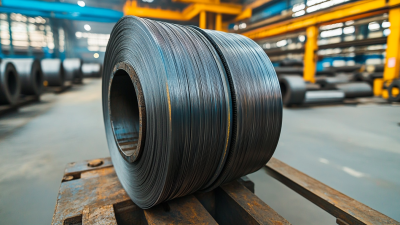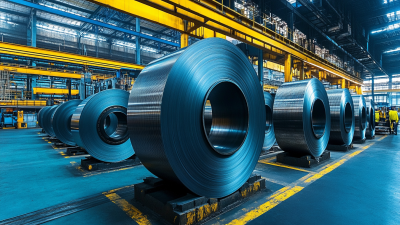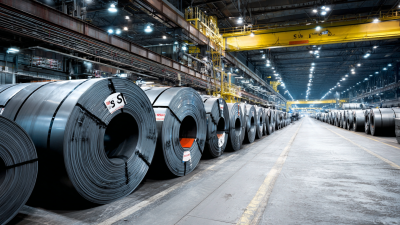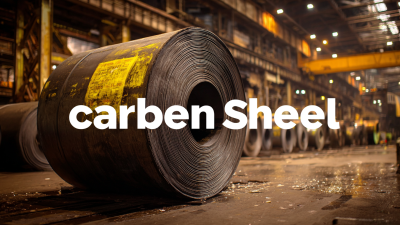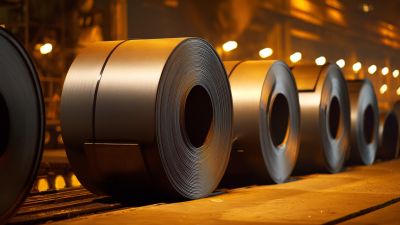In the ever-evolving landscape of industrial materials, Carbon Steel Q235 Coil has emerged as a versatile solution capable of meeting the diverse needs of various industries. According to a report by MarketsandMarkets, the global carbon steel market is projected to reach USD 1.19 trillion by 2025, driven by the growing demand for durable and cost-effective materials. Carbon Steel Q235 Coil, known for its excellent weldability and mechanical properties, serves as a foundational element in sectors ranging from construction to automotive manufacturing. As industries seek more sustainable and efficient materials, the adoption of Carbon Steel Q235 Coil is expected to rise, highlighting its significance in applications such as structural components, machinery, and pipelines. This blog explores the multifaceted applications of Carbon Steel Q235 Coil, emphasizing its vital role in the contemporary industrial framework.

Carbon steel Q235 coil has emerged as a versatile material widely utilized across various industries due to its excellent mechanical properties and cost-effectiveness. In the construction sector, for instance, Q235 is often selected for structural steel applications. According to a report by the World Steel Association, approximately 1.7 billion metric tons of structural steel are produced annually, with a significant portion being carbon steel grades like Q235. Its yield strength of up to 235 MPa and good formability make it ideal for beams, columns, and reinforcements, ensuring safety and durability in building structures.
In addition to construction, the automotive industry is also leveraging the advantages of Q235 coils. With the global automotive steel market projected to reach 122 million tons by 2025, Q235 serves as a key material in manufacturing car components. The material's balance of strength and weight is critical for producing parts that require toughness yet remain lightweight, enhancing fuel efficiency. Furthermore, a report from Market Research Future indicates a strong CAGR of 5.8% for carbon steel in automotive applications, underlining Q235's role in supporting innovative designs while maintaining cost efficiency in production processes.
The innovative manufacturing techniques utilizing Q235 steel coils have revolutionized various industrial sectors, especially in construction and automotive applications. According to the China Steel Industry Association, Q235 is widely recognized for its excellent weldability and malleability, making it a preferred choice for manufacturers. With an increasing demand for high-quality steel materials, the global market for Q235 coils is projected to grow at a CAGR of 5.4% between 2023 and 2028. This growth is largely driven by advancements in production processes, such as cold rolling and hot dipping, which enhance the material's properties while minimizing waste.
In the automotive industry, Q235 coils are becoming essential in vehicle framing and structural components due to their lightweight yet sturdy characteristics. A recent report from MarketsandMarkets indicates that the automotive sector is expected to consume over 30% of the total Q235 steel supply by 2025. Additionally, innovative manufacturing techniques, such as laser cutting and robotic welding, have enhanced the fabrication efficiency, allowing for the mass production of high-strength automotive parts with intricate designs. These advancements not only improve production rates but also ensure that the final products meet stringent safety and performance standards.
Carbon steel Q235 coil is increasingly recognized for its essential role in construction and infrastructure projects due to its favorable properties. This low-carbon steel variant boasts excellent weldability, machinability, and ductility, making it a preferred choice for fabricators and builders alike. According to a report published by the World Steel Association, low carbon steels, including Q235, account for approximately 50% of global steel consumption, a testament to their versatility and reliability in various applications.

In the construction industry, Q235 coil is often used in structural components such as beams, columns, and reinforcements. Its ability to withstand heavy loads while maintaining structural integrity is particularly valuable for infrastructure projects like bridges and highways. A study conducted by the International Journal of Structural Engineering indicates that incorporating Q235 steel in construction can enhance overall durability by 30%, reducing long-term maintenance costs. Furthermore, its cost-effectiveness, with prices averaging around $500 per ton, positions Q235 as an attractive option for budget-conscious projects without compromising on quality.
The use of Carbon Steel Q235 coil has garnered attention across various industries, particularly due to its sustainable practices. Manufacturers are increasingly acknowledging the environmental impact of steel production and are turning to Q235 for its recyclability and lower carbon footprint. This type of steel is often produced using energy-efficient methods, which not only mitigate greenhouse gas emissions but also promote resource conservation. As industries strive for greener practices, Q235 emerges as a viable option that supports sustainability while maintaining reliability and strength in applications.

Furthermore, sectors like construction, automotive, and manufacturing are now leveraging Carbon Steel Q235 in innovative ways that align with sustainable objectives. In construction, for instance, Q235 is used for structural components that are not only durable but also recyclable at the end of their life cycle. The automotive industry benefits from its lightweight properties, which can improve fuel efficiency while adhering to environmental standards. Additionally, manufacturers are adopting closed-loop systems to ensure the recycling of Q235, thereby minimizing waste and optimizing resource usage. These advancements illustrate how Carbon Steel Q235 is not just a material of choice but a smart investment in sustainable industrial practices.
The future of Q235 carbon steel coil applications holds remarkable potential across various industries. As the construction sector moves towards sustainable practices, the demand for versatile materials like Q235 is expected to surge. According to a report by the World Steel Association, the global construction industry is projected to grow by 3.9% annually over the next five years. This growth will create ample opportunities for Q235 coils, particularly in structural frameworks, reinforcing bars, and steel plates, which are vital for ensuring safety and durability in modern buildings.
Moreover, the automotive industry is increasingly adopting Q235 steel for manufacturing components, thanks to its excellent weldability and formability. A recent market analysis by Mordor Intelligence suggests that the automotive sector's demand for carbon steel will witness a CAGR of 4.5% through 2026, driven by the need for lightweight materials to improve fuel efficiency and reduce emissions. As automotive manufacturers innovate to meet stricter environmental regulations, Q235’s adaptability will become a significant asset, positioning it as a material of choice for both traditional and electric vehicles.
